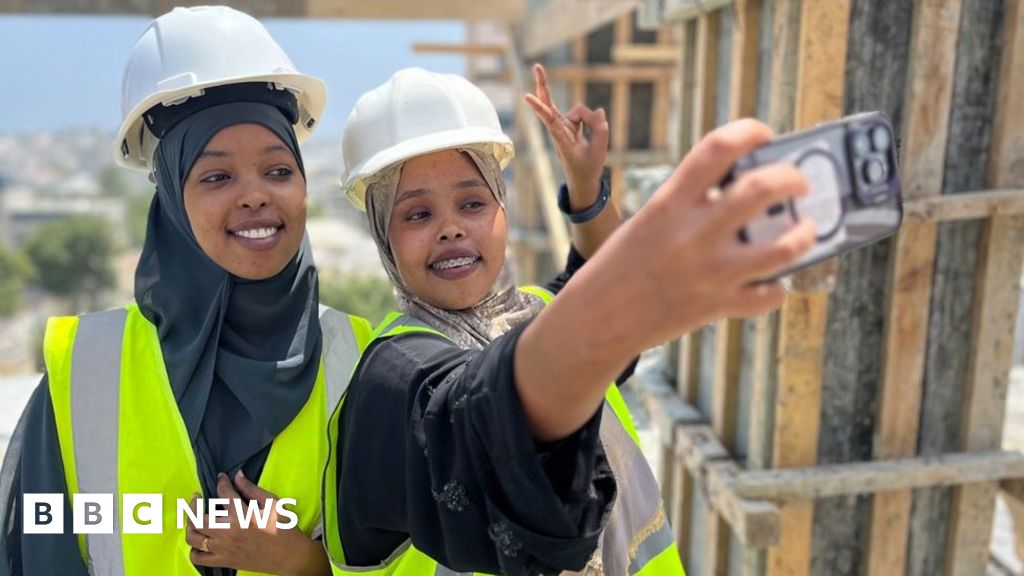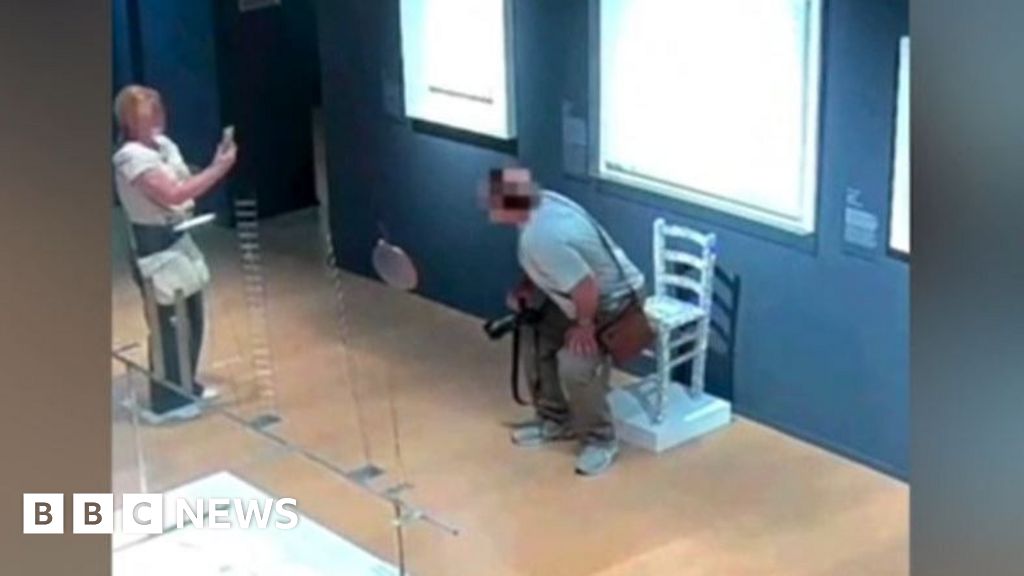ARTICLE AD BOX
By Emmanuel Onyango
BBC News, Nairobi
The famous pimped-up matatus, or minibus taxis, of Kenya's capital, often move through the traffic to the sound of Nigerian Afrobeats music, Tanzania's Bongo Flava or South Africa's Amapiano.
Step out of the vehicle and the foreign tunes are booming through the speakers of street vendors.
And likewise on the radio, the most played tunes are rarely from Kenya.
The global rise of Africa's urban pop music scene has been a source of pride for the continent, but in Kenya it has also raised concerns that local musicians are being squeezed out.
Some in the industry say that new Kenyan talent is not being given the chance to break through.
One radical solution is to raise the quota for Kenyan music on radio stations from the current 40%, agreed in 2014, to 75% of the tracks aired.
The drive is being led by popular local comedian, Eric Omondi, who recently staged an eye-catching protest outside parliament while enclosed in a glass box that was emblazoned with the words "play 75% Kenyan".
Comedian Eric Omondi sat in a glass box outside parliament to publicise his push for more local music on the radio
Several MPs expressed support for his push, including John Kiarie, a former comedian, who later urged parliament to "unlock" the potential of Kenya's creative economy sector by approving the proposal.
"I'm pushing for more upcoming talents to be featured on radio and TV. I want to ensure our youth get airplay and build their brands and become self-sufficient," Omondi told BBC Swahili.
But the current figure of 40% is already a hefty amount and there are questions as to why, given this exposure, Kenyan musicians continue to struggle.
One of the difficulties is that more airplay has not translated into more revenue for the artists.
Lack of royalties
The problem is that Kenyan broadcasters, while complying with the quota, have been reluctant to pay royalties.
Court cases challenging this non-payment have dragged on for years.
"We're only collecting about 20% of the royalties," said Peter Inyenze, the head of the Music Copyright Society of Kenya - the body that represents owners of music copyrights.
"This has been a problem in Kenya over the years. Broadcasters have always said that they have no money and business was not good."
A presidential decree last year included the payment of royalties as a condition for the renewal of broadcasting licences - so things may change.
Mr Inyenze said he has now been getting correspondence from broadcasters about paying their outstanding royalties.
But, perhaps because of the lack of money, there is also the question of whether there is enough new quality Kenyan music being produced to fill the proposed quota.
Image source, Getty Images
Image caption,Nigerian musician Burna Boy is a regular performer in Kenya
In order to respond to the challenge of Afrobeats and Bongo Flava, some local musicians have adopted West African accents in English, or the way Tanzanians speak Swahili. A worrying sign for some of a loss of self-confidence and originality.
But what choice do they have if they want to compete?
The regular concert appearances in Kenya of Nigerian stars such as Davido, Burna Boy and Omah Lay, and Tanzania's Diamond Platnumz, Rayvanny and Harmonize spark frenzies among their local fans.
With a population of 54 million, Kenya should have the economic and cultural clout to produce homegrown stars who can reach south and west across the continent.
But whereas a decade or more ago Kenyan music - through the Kapuka hip-hop genre - was drawing global interest, this has now fallen away.
Image source, Getty Images
Image caption,Sauti Sol are one of the few Kenyan acts to break through across the continent
Music executive Agnes Nonsizi believes that as it evolved into Gengetone, which was influenced by dancehall and reggaeton, the unique pop identity was chipped away - allowing for the entry of sounds from Nigeria and Tanzania.
There have been some breakout stars like Sauti Sol, Khaligraph Jones and Nameless. But success stories have been few and many have struggled to make money from their talent.
Music publicist Bilha Nguraiya has some harsh words for many Kenyan musicians who she thinks "don't want to compete and measure up" with the continental stars.
"Music was a way for some of them to get away from poverty. And now they are too scared to get out of their comfort zone because it might upset the equation - they don't know better and are afraid to take risks," she told the BBC.
Lewd lyrics
As well as the lack of ambition and business acumen among musicians, there is also the question of identity and how local fans experience the music.
University student Priscilla Awino explains that she prefers Tanzanian Bongo music because of its "poetic" Swahili.
"I can't relate with the message in Afrobeats but it's entertaining, I love the rhythm, the pidgin accent and I find them genuinely cultural - you can tell this is distinctly African."
Some say that one reason Kenyans don't have a strong affinity with local music is because it doesn't have a strong cultural grounding, but Nguraiya disagrees.
"Our music has an identity, it really does. But it's Kenyan consumers who have a problem with the identity. Artists are a mirror of society, but we just don't like what we are seeing in the mirror," she said.
There is also a growing inclination among upcoming musicians for lewdness, fabricated stories of gang violence and controversy that thrusts them suddenly into the spotlight before they soon fizzle and disappear.
Little wonder some local clubs do not play Kenyan music and it is rare to get their visitors requesting Kenyan music, according to DJ Sashi Diva.
"The songs rake in millions of views on YouTube but you can't play them in a club because not every controversial thing will be consumed. That is where Nigerians and Tanzanians beat us," she said.
And this all feeds back into what radio stations are prepared to play and whether they could fill a 75% quota.
Media houses have already raised concerns about the proposal. They argue that radio stations have to air what the audiences want in order to survive.
While Kenyan vernacular radio stations mostly play local music, the national stations that draw the biggest audiences thrive on foreign content.
The Star newspaper - owned by the Radio Africa Group which has six national radio stations - argued in a recent editorial against the need for new legislation as it "will reduce the variety in the output of Kenyan TV and radio".
"Let TV and radios compete for audiences by offering both local and international content in varying permutations," it said.
A desire to support local artists may persuade some parliamentarians to back a quota change, but it may ultimately achieve little if Kenyans continue to prefer foreign sounds.
Around the country, listeners are voting with their ears, and for the moment Afrobeat and Bongo Flava are clear favourites.
You may also be interested in:
For Burna Boy there's never been a better time for African musicians to tell their own stories.

 3 years ago
71
3 years ago
71








 English (US) ·
English (US) ·